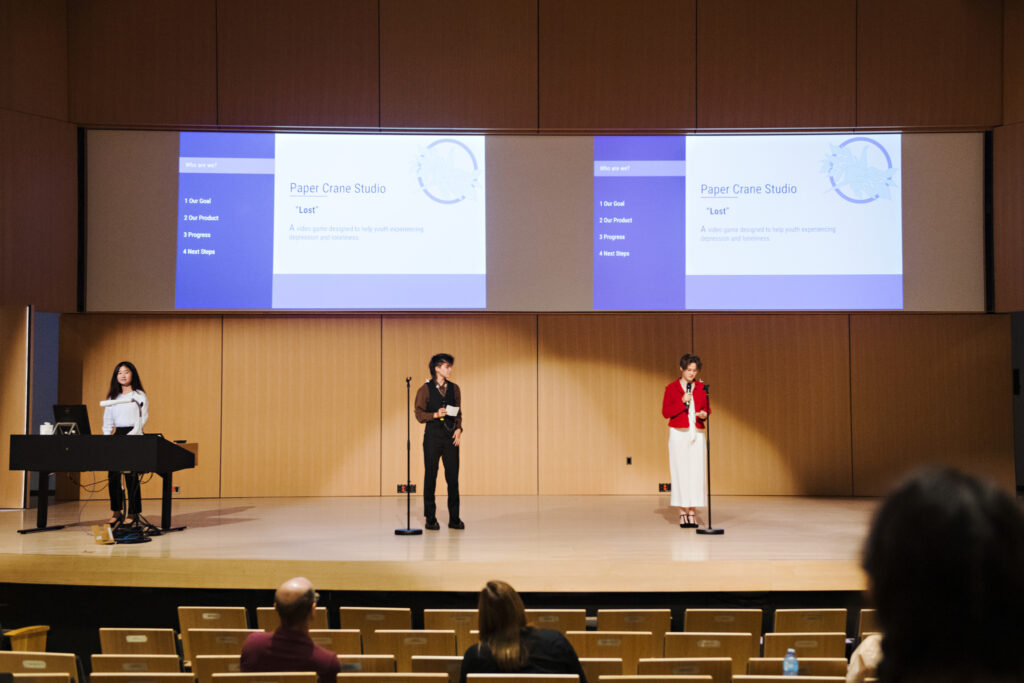Get a roomful of Shad Canada participants together four months after their July immersion and even if it’s a Zoom room there is a general chatter that arises, with a fresh outbreak of smiles with each new face that pops on screen. One feels almost hesitant to get down to business, and ask them about their summer Design Challenge pitch that caught the attention of so many in the room at Shad Laurier where they all met. But they’re enthusiastic about that too.
One of Shad’s most anticipated annual activities, the Design Challenge invites a team to tackle a complex problem and put their creativity to work. Past design challenges have explored topics like how to help Canadians treat fresh water with respect, or leverage space as a creative research platform. In 2022, the big question focused on wellbeing. Throughout their month, teams meet regularly and develop a project that responds to the theme. At the end of the month, the teams come together to present their ideas to a panel of experts who provide feedback and encouragement.

The Paper Crane Studio, as these Shad Laurier students named themselves, decided to tackle the wellbeing theme by focusing on teenage depression and isolation. “As a collective, we noticed the problem of young teenagers dealing with depression by themselves, and especially isolation that has been amplified through COVID times. So, we thought a great way to help these young individuals is by creating a video game to teach them different coping mechanisms and a way to deal with these topics and to learn how to overcome them,” says Paper Crane Studio team member Valerie Lehar from Calgary, Alberta, who pitched the idea on presentation day alongside teammate Olli Zelek, from Marathon, Ontario.
In practical terms, the project developed into a video game called Lost, which the students designed to be adventure-based and use non-player characters to help the main character learn to communicate to move forward. The character carries a lantern that brightens as they move throughout the game, representing progress made. The purpose is to teach coping skills that help players move forward out of isolation.
As the team came together through the design challenge project, part of the fun was in discovering how all their different interests and skills fit together. The idea to create a video game was suggested by teammate Jonathan Lan from Dollard-des-Ormeau, Quebec (not on the Zoom call) who provided the coding talent to the project. Lehar says that once they started to assess the strengths, roles naturally emerged. Eureka Liu, from Surrey, BC, says that it was fun to figure out how they all fit together. “I remember when I first met up with my group, I found we were all very strong personalities but with very different interests.” Lehar agrees that they quickly found their places. “Eureka is a very strong business model manager. As an amazing artist, Olli got the role of making all the art for the video game. I was filling in here and there and doing public speaking, and then George [Obasuyi from Markham, Ontario, not on the call] was taking over the music,” she says.
Zelek says the opportunity to bring ideas together in person also emphasized the benefits of their month-long immersion, where ideas could be shared over breakfast or by a knock on a teammate’s door. “Being in the same space just working and trying to figure out the project element in our niche, whether it be music or design; honestly, I haven’t found a space as productive since or before.”
When it came time to pitch the project, Lehar says that not only was the feedback helpful but there was a feeling of pride in how impressed the judges were with their output. “I think all groups surprised the judges. I don’t think they were prepared for the level of depth and engagement we put into all of our presentations,” says Lehar, adding that the Shad students were also excited to hear what the other groups had come up with.
These Shad peers also agree that the design challenge really was a microcosm of the overall Shad experience, which each declared had changed their lives. “I just remember thinking, ‘I will never be in a room with such incredible energy and people ever again.’ The Shads are amazing and I’ve been trying to bring that energy into my school from Shad. It’s just a life-changing month where you get to be yourself and figure out who you are and where your passions are and just experience knowledge and learning in a way that you won’t anywhere else,” says Zelek.